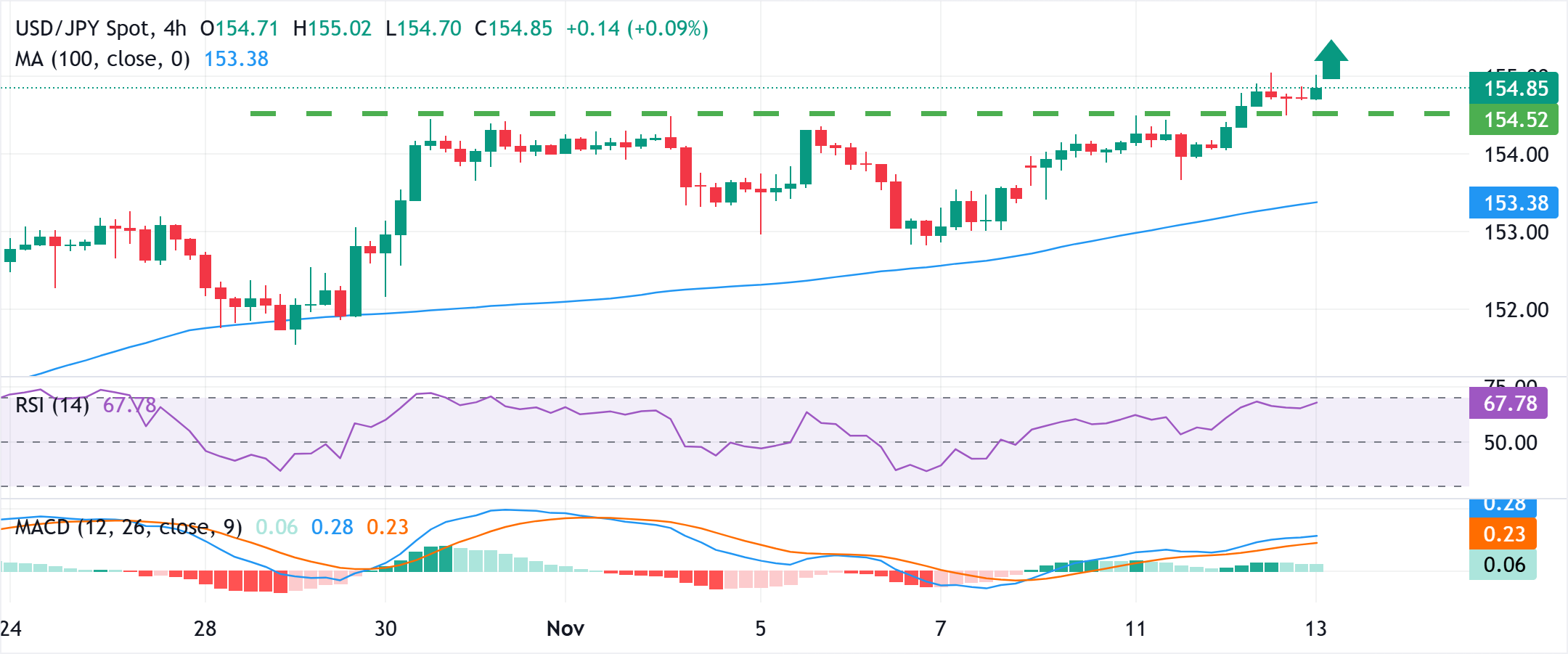Created
: 2025.11.13














![]() 2025.11.13 11:10
2025.11.13 11:10
The Japanese Yen (JPY) remains on the defensive during the Asian session on Thursday and reacts little to Bank of Japan (BoJ) Governor Kazuo Ueda's comments, saying that the underlying inflation is gradually accelerating toward the 2% goal. Traders, however, remain uncertain about the BoJ's policy tightening plan amid Japan's Prime Minister Sanae Takaichi's pro-stimulus stance. This, along with the optimism led by a positive development to reopen the US federal government, seems to undermine the safe-haven JPY.
Meanwhile, the recent decline in the JPY prompted Japan's Finance Minister Satsuki Katayama to issue a warning on currency movements. This fuels speculations that Japanese authorities could step into the markets to stem further JPY weakness and hold back bears from placing aggressive bets. The US Dollar (USD), on the other hand, struggles to lure buyers amid Federal Reserve (Fed) rate cut bets and concerns that the longest US government shutdown could affect the economy. This contributes to capping the USD/JPY pair.

From a technical perspective, Wednesday's breakout through the 154.45-154.50 supply zone was seen as a fresh trigger for the USD/JPY bulls. Moreover, oscillators on the daily chart are holding in positive territory and back the case for additional gains. A sustained strength beyond the 155.00 psychological mark will reaffirm the constructive outlook and lift spot prices towards the 155.60-155.65 intermediate hurdle en route to the 156.00 round figure.
On the flip side, any corrective pullback below the 154.50-154.45 resistance breakpoint could be seen as a buying opportunity near the 154.00 mark. A convincing break below the said handle, however, might prompt some technical selling and drag the USD/JPY pair to the 153.60-153.50 intermediate support. Spot prices could decline further towards the 153.00 round figure, which, if broken, should pave the way for a further weakness towards the 152.15-152.10 region.
The Japanese Yen (JPY) is one of the world's most traded currencies. Its value is broadly determined by the performance of the Japanese economy, but more specifically by the Bank of Japan's policy, the differential between Japanese and US bond yields, or risk sentiment among traders, among other factors.
One of the Bank of Japan's mandates is currency control, so its moves are key for the Yen. The BoJ has directly intervened in currency markets sometimes, generally to lower the value of the Yen, although it refrains from doing it often due to political concerns of its main trading partners. The BoJ ultra-loose monetary policy between 2013 and 2024 caused the Yen to depreciate against its main currency peers due to an increasing policy divergence between the Bank of Japan and other main central banks. More recently, the gradually unwinding of this ultra-loose policy has given some support to the Yen.
Over the last decade, the BoJ's stance of sticking to ultra-loose monetary policy has led to a widening policy divergence with other central banks, particularly with the US Federal Reserve. This supported a widening of the differential between the 10-year US and Japanese bonds, which favored the US Dollar against the Japanese Yen. The BoJ decision in 2024 to gradually abandon the ultra-loose policy, coupled with interest-rate cuts in other major central banks, is narrowing this differential.
The Japanese Yen is often seen as a safe-haven investment. This means that in times of market stress, investors are more likely to put their money in the Japanese currency due to its supposed reliability and stability. Turbulent times are likely to strengthen the Yen's value against other currencies seen as more risky to invest in.
![]()
Created
: 2025.11.13
![]()
Last updated
: 2025.11.13

FXStreet is a forex information website, delivering market analysis and news articles 24/7.
It features a number of articles contributed by well-known analysts, in addition to the ones by its editorial team.
Founded in 2000 by Francesc Riverola, a Spanish economist, it has grown to become a world-renowned information website.
We hope you find this article useful. Any comments or suggestions will be greatly appreciated.
We are also looking for writers with extensive experience in forex and crypto to join us.
please contact us at [email protected].
Disclaimer:
All information and content provided on this website is provided for informational purposes only and is not intended to solicit any investment. Although all efforts are made in order to ensure that the information is correct, no guarantee is provided for the accuracy of any content on this website. Any decision made shall be the responsibility of the investor and Myforex does not take any responsibility whatsoever regarding the use of any information provided herein.
The content provided on this website belongs to Myforex and, where stated, the relevant licensors. All rights are reserved by Myforex and the relevant licensors, and no content of this website, whether in full or in part, shall be copied or displayed elsewhere without the explicit written permission of the relevant copyright holder. If you wish to use any part of the content provided on this website, please ensure that you contact Myforex.
Myforex uses cookies to improve the convenience and functionality of this website. This website may include cookies not only by us but also by third parties (advertisers, log analysts, etc.) for the purpose of tracking the activities of users. Cookie policy